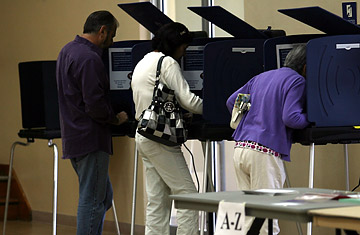
Floridians vote at the C. Lawton McCall Community Center during the Florida primary on January 29, 2008, in Miami Shores, Florida.
It is looking increasingly likely that Democrats in Florida and Michigan are going to have a do-over of their primaries, so that their 366 delegates — who could be enough to tip the nomination one way or the other — can be seated at this summer's Democratic National Convention in Denver. The big questions now: How would they do it, and who would pay for it?
The day after Hillary Clinton's victories over Barack Obama in the Ohio and Texas primaries made the race even tighter, Florida Governor Charlie Crist, a Republican, and Michigan Governor Jennifer Granholm, a Democrat, called upon the party to seat their delegates, saying to do otherwise would silence "the voices of 5,163,271 Americans" who voted in their primaries. In Florida, for instance, 1.75 million Democrats voted, which was the best Democratic turnout in state history. That sentiment has been echoed by Clinton supporter Florida senator Bill Nelson as well as the Clinton campaign itself, which won both crucial swing states and could pull even with, or possibly ahead of, Obama if its share of the delegates were being counted.
Still, as the Obama campaign has never tired of pointing out, all of the Democratic candidates had refused to campaign in either state. And in Michigan, Barack Obama's name wasn't even on the ballot (40% of the vote there, in fact, went to "uncommitted.") Many voters who might have gone to the polls say they didn't. For that reason, the Democratic National Committee (DNC), and its embattled head, Howard Dean, keep stressing that it wouldn't be fair now to suddenly change the rules that were agreed to a year ago. (The Clinton camp, however, insists it simply agreed not to campaign in the two states, not to have their delegates thrown out.)
The DNC voted to strip the two states of their delegates if they decided to move their primaries earlier than Feb. 5. (The Republicans, for their part, opted for a lighter punishment, vowing to take away half of each state's G.O.P. delegates.) But the states moved their primaries ahead anyway.
At the time, it looked like the whole thing would be academic. Both Michigan and Florida are crucial swing states, and neither party was willing to alienate the electorate come November. Surely, everyone thought, the party would have a nominee long before the convention, and the two states would then be allowed to go ahead and send their delegates anyway.
That indeed is what is likely to happen with the Republicans, who now have a nominee in John McCain. But with the Democratic race dragging on into at least April, the fate of that party's Florida and Michigan delegates is looking more and more important in determining who the nominee will be.
So what happens now? One thing that both states have made clear is that any new vote must not be paid for with public money, and the Democratic National Committee doesn't have the cash to do it either. That, however, is not an insurmountable obstacle, as federal law allows the state parties to raise unregulated "soft money," and well-heeled Democratic donors across the country presumably would see the need to get the issue resolved and chip in, especially if both campaigns support the idea. "The biggest incentive for both campaigns is that this is a way to repair all the damage, and build for November," says one Florida party official.
The bigger question is how would they do it. In Michigan, which has experience holding caucuses, that route is one possibility. Another would be a so-called "fire house primary," which is sort of a hybrid process that takes place in an open room, not in voting booths.
But what to do in Florida is more of a challenge. To start with, the Sunshine State is vast, with 4.7 million registered Democrats, and has never held a caucus.
Organizing one from scratch would almost certainly be a disaster in a state whose name is already synonymous with electoral fiasco. What's more, it has more than 30,000 overseas military personnel in its voter files. And there are voting rights issues as well, including the need for bilingual ballots.
One possibility that Florida officials are considering is a mail-in vote, similar to the system used in Oregon, to be held in May or early June. The cost of that kind of primary is estimated to be around $5 million to $10 million, which is considerably less than what it would take to hold a traditional state-wide primary.
So for all the hand-wringing, look for a resolution soon. Everyone knows it is in their interest to get this behind them, and it would put to rest some more extreme, legally dubious proposals being thrown around; some Florida state legislators, for instance, have even discussed a bill that would prevent the Democratic presidential nominee from having his or her name on the November ballot if the state's delegates aren't recognized.
What's ironic about the whole controversy is that both states moved their primaries forward in hopes of having more influence in choosing the ultimate nominee. As things turned out for the Democrats, it will be the ones who vote latest — which ultimately may include both Michigan and Florida — that will have the biggest say.
